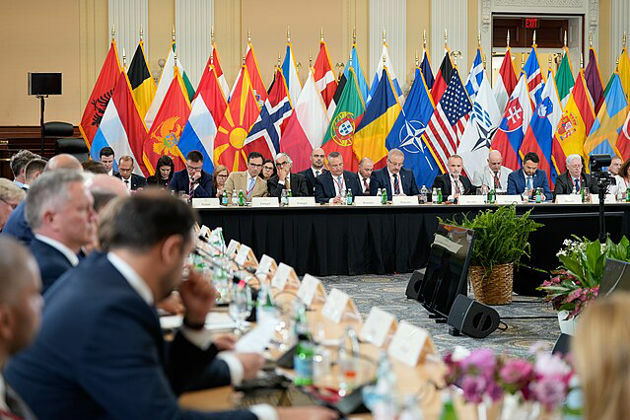Second Lecture on Communicative Rationality
Dublin News
11 Jul 2023, 05:30 GMT+10
Second Lecture on Communicative Rationality
Adapted from a Lecture to the Faculty of Philosophy, University of Sofia
Dr Jonathan Kenigson, FRSA
(Continued from the first lecture). Scholarship involving Habermansian critical theory has neglected to consider the isomorphisms between a tentative epistemological theory of the social sciences and the phenomenological ontology of being provided in Sartre's transcendental humanism. In "Towards a Rational Society" (1968), Habermas can be found defending the social sciences from the positivism of such diverse figures as Comte, Carnap, Wittgenstein, and the Frankfurt marxists like Horkheimer, Marcuse, and Adorno (Horkheimer & Adorno 2003).
According to positivism, the sciences possess a universal structure founded in the reduction of knowledge to empirical verification and - according chiefly to Marcuse - the conflation of the chief end of society as subordinating technological progress aimed at mastery of the natural world. Such reduction would evidently conflate the progress of society with the greater proliferation of technical-rational ends aimed at domination, mastery, and subjugation - a schizoid teleology of violence that manifests in bourgeois hegemonization of the definite goals of social evolution (Baynes 1995; Habermas 1970; 1973; 1987; 1990; Heath 2001; Schomberg & Baynes 2002).
According to the presumed value-neutrality of a positivist account of knowledge, all knowledge is the purely descriptive, factical techne; value-propositions or individual mentalities are so thoroughly dominated by 'evidence' that the individual as such cannot be said to develop except through idiosyncratic self-expression, which the Marcusian state would interpret, rather than as progress, as evidence of deviance or retrogression (Habermas 1968; 1970; 1973; 1987; 2001). Within positivist circles, decisionism asserts that the public interest is sufficiently fragmented that no possible resolution can be found; values, as separate from the inert substance on which the scientific and technological operate, are wholly divorced from dialogical agreement stemming from rational consensus (Baynes 1995; Habermas 1973; 1987; 2003; Heath 2001; McCarthy 1991; Rawls 1997).
If science has the last word on facts, it produces, with its broad wings, a shadow of subjectivity that the individual in daily life can neither transcend nor negotiate. For the positivist, the liberal project of Enlightenment rationalism dies a slow but steady death at the hands of material production - in a Hegelian sense, like Kronos, the project devours itself by the excess of its inert end - the hegemon of a universal calculus of decisions. The political consequence of decisionism is the reification (or 're-feudalization') of representative or republican governmental forms, in which political power is invested in actors according to already-formed conceptions of values rather than the vigorous contestation of values (McCarthy 1991). Technology becomes sufficiently specialized that political activity is in the realm of technical experts rather than citizens; questions of what constitutes social progress become absent to the polis, to be legitimated and decided by others and for the aims of securing a narrowly defined plurality of objectives, many of which can be represented numerically (GDP, GINI index, literacy rates, poverty rates, etc.) (Habermas 1970; 1973; 1987; 2001)
In "Knowledge and Human Interests," Habermas seeks to combat this positivist epistemology's static account of knowledge by paying particular attention to the processes by which theories about the world inform, and are informed by, practical theories about the world and about societies. Labour in nature is held as separate from the interactions among individuals. The practical interest of society is the intersubjectivity of norms of cultural and communicative discourse - not (as Popper would have it), in the conversion of norms about metaphysics to norms about the resolution of scientific-methodological questions (Habermas 1970; 1987).
Knowledge itself tends toward an emancipatory interest in society - an inherent, anthropologically deep-seated drive toward human interest in autonomy from hegemony or the reifications of the lifeworld - the background, unconsciously-accessed repository of practices, norms, and customs that constitute culturally-situated wisdom-norms. Surgery on the lifeworld - or ideological work - is performed discursively from the logic of autonomy and rational consensus. This consensus is not the transcendental analytic of Kant or Hegel, but the emancipatory nature of knowledge-in-itself that is structured in the inherent logos of the lifeworld.
For Habermas, the nature of social learning is the accumulation of the individual processes of learning that are institutionally curated (1973; 1987; 1990; 2003; Kant 1785). The increased complexity of modern societies is a reflection of this curation, in which both specialists and the public construct repositories of specialized and general knowledge. Especially general institutional knowledge, especially of the social-scientific variety (e.g. regarding norms, values, justifications for legitimating structures of power and discourse) can be subsumed into the lifeworld through what, in Geertzian terms, would be termed 'ideological work.'
It is indeed tempting to draw out parallels between the Sartrean 'practico-inert' and the Habermansian notion of 'institution.' In particular, both deem the bureaucratic institutions of the welfare state to be the outcome of a teleological, dialectical process - for Sartre, of the dialectic between the in-itself and for-itself as the subject learns about his\her own ethical nature through self-construction, and for Habermas - the telos of individual learning about power, relationships, and complexity (Detmer 1988; Dobson 1993; Flynn 1984; Sartre 2000; 1948; 1976; 2007). This parallel must be drawn with great care, however, to avoid unnecessary oversimplification. Habermansian critical theory seeks the emancipation of the subject from ethics through his lived relations and practical discourse in community (Habermas 1970; 1987; 1990). The result of this emancipation is the re-appropriation of the Kantian transcendental analytic and its placement in the context of discourse and speech-situations as the ultimate conveyances of meaning (Kant 1785).
In other words, in the paradigm of a positivist, the locus of individuality is not held to be in the specific subject-matter or practical-social content of a truth claim, but rather in the inherently rational structure of language itself. The result of such speculation is a polypolitan theory of existential-political linguistics in which the transcendental analytic of truth-claims are verified through the agency of speech-contexts ('ideal speech situations') and discourse rather than Sartrean ex-nihilo self-postulation in which the existential content of speech propositions precedes any essentialism as to their meanings (Apel 1990; Habermas 1970; Habermas 1973; Heath 2001).
More specifically, Habermas rejects any correspondence theory of truth in language in its traditional form (vis. deontological ethics, platonism, or even Marxian dialectical materialism) while also rejecting the strong idealist tradition of Hegelian pantheism; he rescues language from relativism via an inversion of the Kantian imperative that ethical statements should apply equally to all rational actors (Habermas 2003; Kant 1785; Rehg 2003). Rather, for Habermas, political truth - like ethical truth - must be the result of definite, inclusive, non-coercive dialogues making use of the inherent logic of language to form eventual consensus between different forms of intersubjectivity (Habermas 1970).
Works Cited.
https://medium.com/@jonathanjkenigson/habermas-lecture-dublin-2023-94ff6b91d32 Share
Share
 Tweet
Tweet
 Share
Share
 Flip
Flip
 Email
Email
Watch latest videos
Subscribe and Follow
Get a daily dose of Dublin News news through our daily email, its complimentary and keeps you fully up to date with world and business news as well.
News RELEASES
Publish news of your business, community or sports group, personnel appointments, major event and more by submitting a news release to Dublin News.
More InformationBusiness
SectionU.S. stocks gain ground as investors shrug off Mideast concerns
NEW YORK, New York - U.S. stocks made strong gains on Monday, brushing off concerns Donald Trump's surprise ambush of Iranian nuclear...
U.S. bombs Iran nuclear sites, investors eye oil and safe havens
NEW YORK CITY, New York: The U.S. bombing of Iranian nuclear sites has cast a shadow over global markets, with investors bracing for...
Farmers exploit loophole in Amazon soy deal to clear rainforest
SANTAREM, Brazil: As Brazil cements its position as the world's top soy exporter, a new wave of deforestation is spreading across the...
Europe eases rates as Fed holds and Trump threatens tariffs
ZURICH, Switzerland: A wave of central banks across Europe surprised markets last week by lowering interest rates, responding to easing...
Federal Reserve chief weighs next move as economic outlook wavers
WASHINGTON, D.C.: The U.S. economy is performing reasonably well, but Federal Reserve Chair Jerome Powell faces a difficult decision...
TikTok gets US reprieve as Trump grants 90-day extension
WASHINGTON, D.C.: President Donald Trump has granted TikTok another reprieve, extending the deadline for its Chinese parent company,...
Europe
SectionDublin Airport given two years to fix passenger limit breach
DUBLIN, Ireland: Dublin Airport has received a warning for going over its allowed number of passengers. As part of a rule set by...
Critics say Özdağ case aims to silence Erdogan opponents
ANKARA, Turkey: A Turkish far-right politician went on trial Wednesday, facing charges of inciting public hatred—an episode critics...
Europe eases rates as Fed holds and Trump threatens tariffs
ZURICH, Switzerland: A wave of central banks across Europe surprised markets last week by lowering interest rates, responding to easing...
Swiss National Bank responds to strong franc and US trade doubts
ZURICH, Switzerland: The Swiss National Bank (SNB) lowered its key interest rate to zero percent on June 19 to respond to falling inflation,...
The Hague faces lockdown for global leaders' meet
THE HAGUE, Netherlands: The city that prides itself on being a beacon of peace and justice—home to institutions like the International...
Senator Duffy lauds proposed laws against vaping in Ireland
DUBLIN, Ireland: Fine Gael Senator Mark Duffy says new laws to regulate vaping products will help make them less attractive to young...












